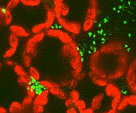Plant Pathology, Department of

Department of Plant Pathology: Faculty Publications
Biological Control of Bipolaris sorokiniana on Tall Fescue by Stenotrophomonas maltophilia Strain C3
Document Type
Article
Date of this Version
9-1999
Citation
Zhang, Z., and Yuen, G. Y. 1999. Biological control of Bipolaris sorokiniana on tall fescue by Stenotrophomonas maltophilia strain C3. Phytopathology 89:817-822.
Abstract
Stenotrophomonas maltophilia strain C3 was evaluated for control of leaf spot on tall fescue (Festuca arundinacea) caused by Bipolaris sorokiniana. In growth chamber experiments, C3 inhibited conidial germination on leaf surfaces and reduced lesion frequency and percent diseased leaf area compared with nontreated controls. The amount of leaf spot suppression was related to the C3 dose applied. The highest dose tested, 109 CFU/ml, prevented nearly all B. sorokiniana conidia from germinating on treated leaf surfaces and provided nearly complete suppression of lesion development. When colloidal chitin was added to C3 cell suspensions of 107 or 108 CFU/ml, biocontrol efficacy was significantly increased over C3 applied alone, whereas addition of chitin to a C3 cell suspension of 109 CFU/ml had no effect. In field experiments, application of C3 to tall fescue turf resulted in significant reductions in infection frequency and disease severity compared with nontreated controls. Strain C3 applied at 109 CFU/ml was more effective than C3 applied at 107 CFU/ml, and amendment of the lower dose with colloidal chitin enhanced its efficacy. Populations sizes of C3 established on foliage in a growth chamber and in the field were directly related to dose applied. Chitin amendments did not affect C3 population size.


Comments
Copyright © 1999 The American Phytopathological Society. Used by permission.